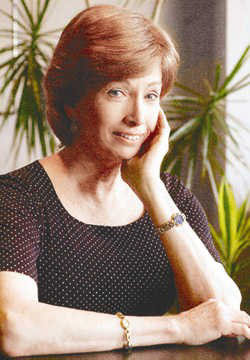Computer
pioneer speaks from the heart
about diversity
Transsexual
talks at HP, CSU
By
Kate Forgach
The
Coloradoan
As
a male-to-female transsexual,

|
|
V.
Richard Haro/The Coloradoan
Distinctive
view on diversity: Lynn
Conway, a computer scientist who was one of the first transsexuals
to have a complete sex-change operation, talked about technology
and gender issues at Hewlett-Packard Co., and Colorado State
University on Thursday. |
Lynn Conway
experienced the exact opposite of the glass ceiling.
Visiting Fort Collins on Thursday to
talk to Hewlett-Packard Co. employees and to speak at Colorado
State University, Conway discussed her topsy-turvy experiences.
As a male computer scientist at IBM in
the 1960s, Conway was shy, introverted, desperately unhappy -
everything that makes the perfect research lab rat.
Squirreled away in his lab, Conway invented
a way for a single central processing unit, or CPU, to perform
multiple operations simultaneously without interfering with itself;
a system unique for its time.
But Conway was miserable because he had
the gender identity of a woman.
As Conway worked as a pioneer in the
computer field, a very important change was under way.
"Right at that time, I was undergoing
a gender transition," Conway told a group of about 75 people
who gathered at Lory Student Center at CSU.
After many years of searching for help,
Conway found a pioneering physician who helped begin medical
treatments that would merge his physical presence with his mental
and spiritual identity.
Conway was among the first transsexuals
to undergo hormonal and surgical-sex reassignment to have his
body completely changed from that of a man into that of a woman.
Just before he underwent the surgery,
however, IBM caught wind of his plans, and he was fired. Conway
lost his wife and two children, friends, colleagues and most
ties to his past.
Amid chuckles from the CSU audience,
Conway reflected on the belief from IBM officials that she would
unleash chaos wherever she went due to her surgery.
But rather than crashing and burning,
as some thought she'd do, Conway flourished.
With a new sexual identity, Conway started
her career again as a contract programmer with no previous experience.
But the joy of feeling free within her femininity showed in her
work. She soon moved through a series of companies to land a
plum job in 1973 at Xerox's new Palo Alto Research Center.
Conway was experiencing the polar opposite
of the glass ceiling. As a newborn woman, she had jets in her
high heels. Introversion had been replaced with outgoing confidence.
"The experience of transition not
only solved my gender problem, but, in return, it had rewarded
me with any number of personal resources," Conway said.
"I was far more mature, more inspired. And when I reached
management level, I wasn't afraid to reach out and surround myself
with incredibly talented people."
Before long, she was on the verge of
international fame in her field for chip-design methods. She
reached that fame, but not before the inevitable whispers began:
"Conway used to be a man."
Conway, now retired, was delighted to
learn that no one, much less her employers, really cared.
"I was lucky - very lucky. And now,
Xerox has established guidelines in place to deal with the issues
surrounding someone going through transgender transition. So
do Apple, Lucent and American Airlines," she said. "There's
now suddenly a sense in the transgender community that something
is happening - that there's a sense of enlightenment; that transsexuals
are being accepted as a matter of diversity."
Conway said she hoped that by telling
her story, more people would come to be accepting of diversity
in gender issues.
It's a message that not only was well
received, but also was embraced by some CSU audience members
who talked of their own experiences as transgendered individuals
or their knowledge of others in similar situations.
It also brought an important message
to others who simply came to hear Conway speak, whether the issue
touched them personally or not.
After Conway's presentation Thursday
afternoon at Hewlett Packard, HP President Carly Fiorina commented
on her company's attitude toward such diversity.
"Diversity is not just a feel-good
issue; it's a critical business issue," Fiorina said. "Simply
put, diversity drives creativity, creativity drives invention,
and invention drives profitability and business success."
"It's hard to see that it really
matters if a person wants to be male or female," commented
Alan Clements of Fort Collins, who attended the talk at CSU.
"The person is what is important."
As Conway said, "The more comfortable
an organization is with diversity - all kinds of diversity -
the higher the glass ceiling is going to be for us all."
Coloradoan reporter Jenn Farrell
contributed to this report. |
|
-- © Copyright 2000, the Fort Collins Coloradoan |
|
|
|